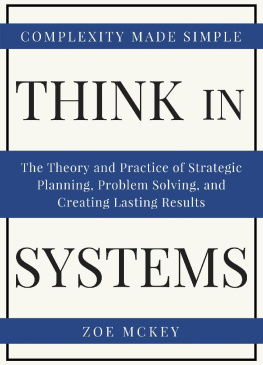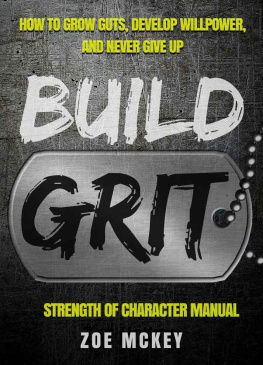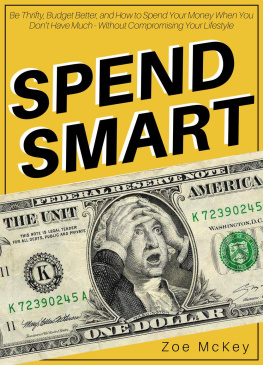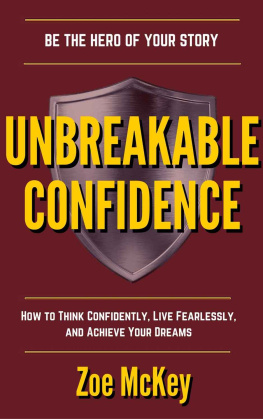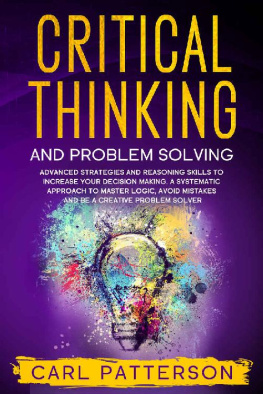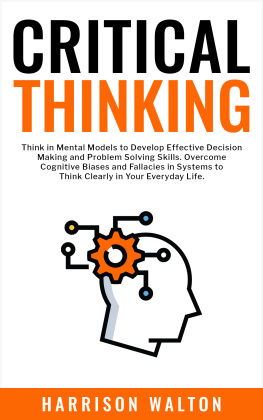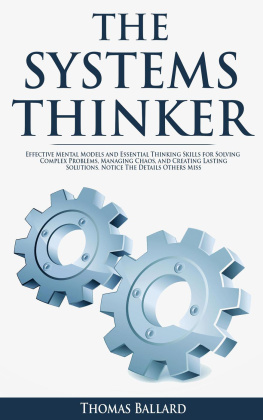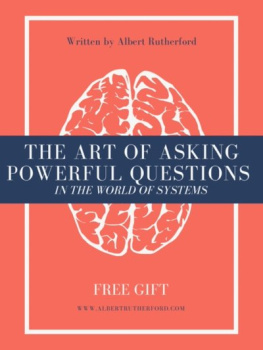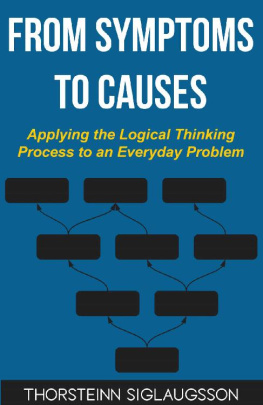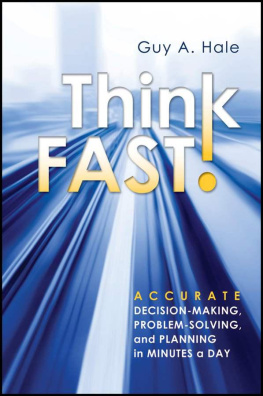Think In Systems
Complexity Made Simple
The Theory and Practice of Strategic Planning, Problem Solving,
and Creating Lasting Results
Zoe McKey
www.zoemckey.com
Copyright 2018 by Zoe McKey. All rights reserved.
No part of this publication may be reproduced, stored in a retrieval system, or transmitted in any form or by any means, electronic, mechanical, photocopying, recording, scanning or otherwise, except as permitted under Section 107 or 108 of the 1976 United States Copyright Act, without the prior written permission of the author.
Limit of Liability/ Disclaimer of Warranty: The author makes no representations or warranties with respect to the accuracy or completeness of the contents of this work and specifically disclaims all warranties, including without limitation warranties of fitness for a particular purpose. No warranty may be created or extended by sales or promotional materials. The advice and recipes contained herein may not be suitable for everyone. This work is sold with the understanding that the author is not engaged in rendering medical, legal or other professional advice or services. If professional assistance is required, the services of a competent professional person should be sought. The author shall not be liable for damages arising herefrom. The fact that an individual, organization of website is referred to in this work as a citation and/or potential source of further information does not mean that the author endorses the information the individual, organization to website may provide or recommendations they/it may make. Further, readers should be aware that Internet websites listed in this work might have changed or disappeared between when this work was written and when it is read.
For general information on the products and services or to obtain technical support, please contact the author.


Thank you for choosing my book! I would like to show my appreciation for the trust you gave me by giving FREE GIFTS for you!
CLICK HERE TO GET THE UNBREAKABLE CONFIDENCE CHECKLIST AND DAILY ROUTINE MAKEOVER CHEAT SHEET!
The checklist talks about 5 key elements of building self-confidence and contains extra actionable worksheets with practice exercises for deeper learning.
Learn how to:
- Solve 80% of you self-esteem issues with one simple change
- Keep your confidence permanent without falling back to self-doubt
- Not fall into the trap of promising words
- Overcome anxiety
- Be confident among other people
The cheat sheet teaches you three key daily routine techniques to become more productive, have less stress in your life, and be more well-balanced. It also has a step-by-step sample sheet that you can fill in with your daily routines.
Discover how to:
- Overcome procrastination following 8 simple steps
- Become more organized
- Design your yearly, monthly, weekly and daily tasks in the most productive way.
- 3 easy tricks to level up your mornings
CLICK HERE TO DOWNLOAD YOUR FREE COPIES NOW!
Table of Contents
Introduction
It was a rainy September morning. I will never forget it. I was rushing to my first-ever university class. Puttering with my class schedule and location, I entered the modern university building. What was the name of that class again? I thought with a buzz of excitement only freshmen feel. The Theory of International Relations, I read off the paper. I had zero thoughts about what this class would end up to be. I understood each of the words individually, but put together, they lost all meaning.
I arrived just before the professor. Because of my delayed arrival, I only found available seating in the first row. I felt exposed to the sharp eyes of the professor, who arrived just when I was trying to fish out my textbook, but from the sudden shock of her appearance, I lost control of my shaking hands, pouring the contents of my backpack onto the ground.
Whats your name? she asked me.
Z-Z-Zoe? I asked her back, which she rewarded with a stern glance. I mean, I am Zoe, yes. I repeated myself, trying to collect my things and the little pride I had left. Great, now she would remember me until graduation.
Well, Zoe, you just gave me a great opportunity to explain the topic of the class in an easy manner. Thank you. I was so surprised that I forgot to say anything and just nodded. She then turned to the class. What happened to Zoe? she asked everyone.
After a few seconds of confused, simultaneous mumbling, someone said, She dropped her bag. The professor nodded and gave the class a look that obviously meant she wasnt satisfied with the answer. So someone else added, She dropped the bag off the table because you scared her.
All the blood rushed out of my face when I saw the professors eyes bulge for a second, but then she laughed. Yes, this is a better description of the event. Then, without waiting for another creative explanation about my shame, she continued.
In linear thinking terms, you are correct. She got surprised, she lost balance, and she dropped her bag. But there is so much more to it. Why did the bag fall to the ground versus just floating around? Why did she choose to take out her book at the last minute? Was she late? Why was she late? Did her bus arrive late? Why did the bus arrive late? Was that the fault of a traffic jam, or some internal organizational problem at the bus company? You see, there is so much more to a dropped bag than we think. She totally got our attention.
As youre now starting to understand, there is much more to a simple event than what it seems to be on the surface. The theory of international relations aims to give a conceptual framework upon which complex relations between the actors of a system can be analyzed.
Here, she lost us Conceptual what? She saw that, and with a chuckle, she explained herself.
In other worlds, we will take a look at the relationship some countries (actors) have with each other, and within. We will learn different theories through which we can explain international phenomena like why wars happen, what the challenges of war preventive policies are, and why we cant truly eradicate hunger, drug wars, and other issues from the world. Our attention was captured again.
To be able to discuss these topics meaningfully and understand each other, first I need to teach you to shift your thinking patterns. There is an entire discipline built upon complex thinking that goes way beyond the regular cause-effect thinking. This is systems thinking.
And there it was, my first encounter with the concept of systems thinking, at the age of 19, on the very first class I had at the university. Ever since then, it has been quite a journey learning about systems thinking. With 10 years of active and profound learning about it, I overcame my hesitation and decided to collect my experience and understanding into a book. Systems thinking had life-changing benefits for my life early on, and Im very grateful for it. This is not as popular or widespread of a topic as it should be, partially because it is a new discipline and partially because it operates with a professional jargon that can be hard to grasp. My goal with this book is to deliver this quintessential discipline to you in an understandable language, profound enough to improve your life and relationships, understand world events, and find better solutions to your problems.
You wont become a graduate systems analyst by reading this book. If thats your goal, I can recommend some more advanced books on systems thinking. This book is an introduction to systems thinking, very handy for those people who are learning about it from scratch, or for those who wish to recapitulate the basic essentials. The book will present the theory of systems thinking in the first few chapters and give you practical examples and homework in the latter chapters. After reading this book, youll be able to understand the jargon of the basics of systems thinking, design simple loops diagrams, behavior over time diagrams, and more. I also provide plenty of references and resources as we go to help you advance your knowledge on the topic, if you wish.
Next page
